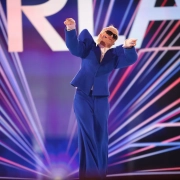Eurovision 2023: Ten countries oppose the EBU’s decision for a closed press centre!
Several broadcasters protested against the EBU‘s decision to hold the first and second rehearsals and press conferences of the first week of the competition behind closed doors. It is to be noted that last year, for the first time, the EBU decided to close the media centre for the first technical rehearsals. However, this year in a statement informed journalists that the second rehearsals will also be held without the presence of accredited journalists, with the press centre of the competition opening one day before the first semi-final for the dress rehearsals.
This provoked a strong reaction from both fans of the contest and some of the national delegations of this year’s Eurovision.
According to exclusive information reported by Aftonbladet, a heated debate had been preceded by 30 delegations which resulted in eight competing countries sending a letter of protest to the EBU asking for this decision to be changed.
More specifically, in discussions that had taken place in mid-March between the chiefs of the 37 competing countries, but also the press officers, the problem of non-journalistic coverage of the first and second rehearsals of the entries arose. For this reason, countries such as Portugal, Malta, the Czech Republic, Switzerland, San Marino, Azerbaijan, Latvia, and Poland signed a letter of protest to the EBU’s Eurovision press officer, Dave Goodman. Belgium, and Estonia were also due to sign the letter, but when they announced their support, the letter had already been sent.
Unfair to those competing in the A’ semi-final.
The letter highlights the unfairness for those competing in the first semi-final, as the press centre does not open until the day before the semi-final. For this reason, concerns are expressed as without the press centre being open and without interviews with journalists in attendance, it would lead to most accredited journalists not being there until the opening ceremony on Sunday 7 May. Thus, the countries competing in the first semi-final have very limited time for interviews and meetings with journalists compared to those competing in the second semi-final.
Specifically, the letter states:
“We believe that this decision is not fair to the countries involved in the first semi-final.”
In previous years, we have all experienced that the vast majority of interviews have taken place in the first week, when there is more free time between rehearsals.
On 8 May, as you can imagine, the artists competing in the first semi-final will have no time to spend with the media. The schedule is very tight and they have to concentrate on their performances.”
The response from the EBU was not long in coming:
“The cost is excessive. The cost of maintaining a press centre is high and the vast majority of traditional media outlets do not
tend to reach Eurovision city only during the week of the broadcast.
The EBU took the decision to close all rehearsals to the media to protect the artists from negative comments online and allow them to complete their performances in privacy.”
In his response Dave Goodman , also highlighted the fact that the EBU allowed voluntary “meet & greet” events at off-site venues where fans and journalists could meet the artists who chose to participate in the press centre
Source: Aftonbladet
Stay tuned to EurovisionFun for more news about Eurovision 2023!

 Photo: Peter Wixtröm/Aftonbladet
Photo: Peter Wixtröm/Aftonbladet Photo: Andreas Papayiannakis
Photo: Andreas Papayiannakis


Leave a Reply
Want to join the discussion?Feel free to contribute!